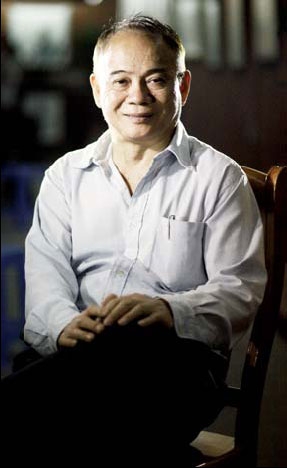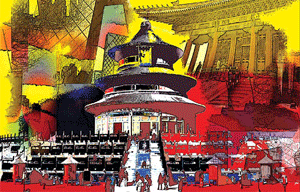Master of the arts
Updated: 2011-11-04 10:55
By Liu Lu (China Daily European Edition)
|
|||||||||
Passion, endurance of a pioneer helped shape art fortunes
The bronze sculpture of a giant hand raising a paintbrush to the sky at the entrance of Dafen village reminds visitors of the pillar industry in the modern suburb of Shenzhen.
|
 Huang Jiang set up the first art gallery in Dafen village in 1989. Provided to China Daily |
In the village, the scents of painting oils permeate the air, while soft classical music drifts out of the storefronts. The romantic atmosphere and affluence makes it hard to believe that Dafen was a poor village relying solely on farming and fishing 30 years ago.
Every resident here knows the village's fame and prosperity is closely related to Huang Jiang, Dafen's first art entrepreneur from Hong Kong.
It all began 22 years ago when Huang came to Dafen to ply the copy-art skills he had learned in Hong Kong, which had unexpectedly inspired the unknown village.
"When I first came to Dafen in 1989, it was just a remote village. There was nothing here besides dirt roads, flocks and herds. Life was very difficult back then," the 66-year-old says.
Born in Xihui of South China's Guangdong province, Huang always had an inborn interest in art.
At the age of 14, Huang's mother sent him to learn sketching from Wu Yichuan, the former principal of the Guangzhou Academy of Fine Arts. The one-year training he learnt then equipped him with the basic knowledge of painting.
In 1970, Huang moved to Hong Kong. Before picking up the paintbrush again, he worked as construction worker, decorator and bartender.
Two years later, Huang chanced upon a friend who was earning HK$3,000 ($386, 273 euros) a month by selling reproductions of oil paintings to foreign traders.
With an eye on better prospects, Huang then made the most important decision of his life - starting painting again.
Huang continued to work as a bartender at night, but attended oil painting classes for amateurs in the daytime. Huang's talent coupled with his past training helped him progress.
One year later, Huang opened his own art studio in Hong Kong. He began to sell dozens of copied paintings every month, with most of his orders coming from art dealers in the United States and Europe.
But the high cost of running a business in Hong Kong forced Huang to move his operations to the cheaper mainland. In 1989 he settled in Dafen, a five-hour drive from Hong Kong.
"The low cost of labor, cheap rent and convenient transportation coupled with the close proximity to Hong Kong all contributed to my decision to stay in Dafen," Huang says.
He rented a room from a villager and began recruiting apprentices, who were mostly uneducated farmers and factory workers, and started teaching them basic painting skills.
Huang and his more than 20 art students became Dafen's first art explorers. They replicated world famous oil paintings for foreign clients and shipped them abroad via Hong Kong.
"The lack of understanding of the mainland economy was an impediment for my business in the early days," he says.
But his efforts paid off. Gradually, with increasing fame, more art dealers from all over the world came to buy paintings from Huang. In peak time, Huang hired some 1,000 workers to help finish piled up orders.
"For those without any art background, three to six months intensive training is good enough for imitations," Huang says.
Inspired by the assembly lines in clothing and car factories, Huang invented a new model of painting by adopting the mass production painting method to accelerate production.
He asked every painter to take charge of only one part of a painting. For example, in a portrait painting, painter A only drew noses and lips, painter B only drew eyes and eyebrows and painter C was only in charge of mixing colors. Using this method helped Huang achieve the same qualities in all his paintings.
Huang's biggest customers are overseas department stores and hotels. In the late 1990s, he began to receive orders from Walmart in the United States.
Huang still remembers the first order he got from Walmart, which wanted him to imitate 55,000 paintings in just 45 days. It was a tough job, but its completion saw Huang making $1 million (731,000 euros) in profit.
"At that time I was the largest oil painting supplier to Walmart in the US," Huang says.
Thanks to his ability to produce high quality paintings in bulk, Huang also became the largest oil painting supplier to Florida state in the US, during the 1990s and early 2000s.
"I felt a strong sense of achievement when I noticed many hotels in the US were decorated with my paintings. It was a feeling that is hard to describe."
Huang says his success was "completely unexpected", but what he did marked the first step of Dafen village's oil painting business, which includes reproductions, wholesale and overseas shipments.
His methods led to a booming business, which others soon followed. Using Huang's business model, many of his students later opened their own art workshops in Dafen.
"He is a pioneer," says Zhou Xiaohong, a Huang's protg who came to Dafen in 1989 and is currently the owner of one of Dafen's biggest art galleries and the vice-president of the Art Industry Association in Dafen's oil painting village.
"Huang made art a kind of commodity which creates employment for local people and most importantly, changed the fate of Dafen," Zhou says.
Huang's efforts have since paid off and Dafen is recognized today as a major oil painting production base globally. For his contributions, Huang has been named the "Art Godfather of Dafen" and was awarded honorary villager status by the local government.
"It's painting and not me that has reshaped Dafen," he says.
Apart from running three oil painting factories in Dafen, Dongguan and South China's Hainan province, Huang also runs the estate management of a big gallery house named in his honor in Dafen, which houses at least 60 art dealers.
He has also expanded his business to Beijing and Zhejiang province by opening upscale oil painting galleries targeting the super rich there.
"More and more Chinese people have now started to appreciate oil paintings. My paintings will be injected with more elements of Chinese traditional culture and art to cater to the esthetic tastes of Chinese shoppers," Huang says.
He has no plan to retire. After opening art schools in Dafen and Hainan, Huang wants to open a third one in Lijiang, in southwestern Yunnan province soon.
"I believe oil paintings not only decorate people's houses, but also decorate people's lives."











